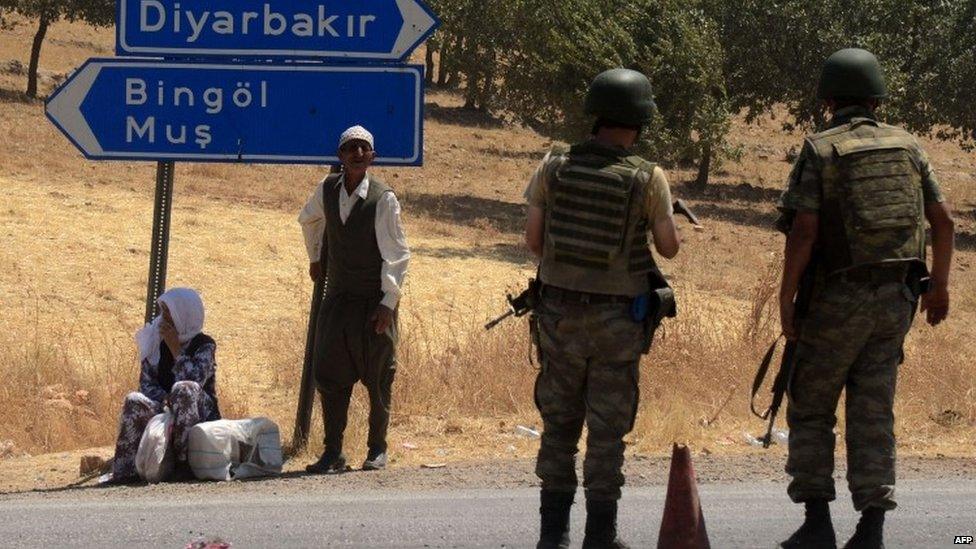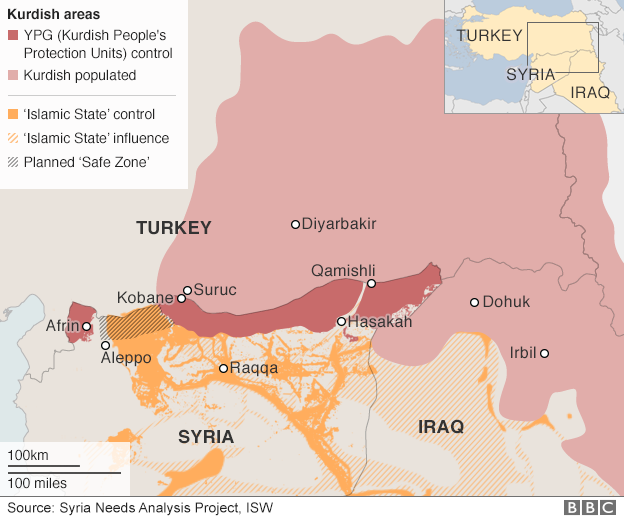Kurd leader attacks Turkey's 'safe zone' plan for Syria
- Published
Selahattin Demirtas says Turkey's battle against IS is simply a cover for operations against the PKK
A "safe zone" Turkey and the US are creating in Syria is an attempt by Ankara to stop Kurds from forming their own territory, the leader of Turkey's pro-Kurdish party has told the BBC.
HDP chairman Selahattin Demirtas said Turkey's operation against Islamic State militants across the border was a cover to target PKK Kurdish rebels.
He urged both Turkey and the PKK to return to the peace process.
Ankara earlier said PKK attacks on Turkey made peace attempts impossible.
There has been a recent series of clashes between Turkish forces and the PKK (Kurdistan Workers' Party).
Turkey has also been hit by attacks by IS-linked militants - including one that left 32 dead in the border town of Suruc last week.
Turkey considers both the PKK and IS terrorist organisations.
Turkish planes struck PKK sites in northern Iraq overnight Tuesday into Wednesday, in what Reuters said was the heaviest such assault since last Friday.
There were no immediate reports of casualties.
Separately, the US has confirmed it was holding talks with Ankara about their joint military campaign against the IS in Syria.
Paul Adams explains who Turkey is targeting with air strikes
State Department spokesman John Kirby said "more coalition effort and energy" would now be focused on the border area.
But he rejected suggestions that the US had sanctioned Turkey's air strike on Kurdish forces in northern Iraq.
Over the past week, analysts say, Turkey has turned its approach to the US-led coalition against IS on its head.
Previously a reluctant partner, it is now flying combat missions and making its airbases available to US jets.
'Seriously disturbed'
Turkey and the US have been working together to create the "safe zone" in northern Syria that would be cleared of IS militants.

Soldiers have been patrolling some Kurd-dominated areas in south-east Turkey after recent attacks
The area - about 90km (55 miles) long - would ostensibly be used to train moderate opposition forces, the BBC's Mark Lowen in Turkey reports.
Ankara hopes, our correspondent adds, that this will also allow some Syrian refugees in Turkey to return to the secure zone.
But Mr Demirtas, who leads the HDP (People's Democratic Party), told the BBC that Turkey's real intention was to make an incursion into Kurdish areas in Syria so as to stop Syrian Kurds from controlling contiguous territory.
"Turkey doesn't intend to target IS with this safe zone. The Turkish government was seriously disturbed by Kurds trying to create an autonomous state in Syria," Mr Demirtas said.
The threat from the group calling itself Islamic State could revive animosity between Turks and Kurds
He added that Turkish President Recep Tayyip Erdogan"would never let this happen and that we would intervene whatever the cost".
"So, the safe zone is intended to stop the Kurds, not IS. In fact, Turkey should work with Kurdish forces to create this area. They should collaborate," Mr Demirtas said.

Earlier, President Erdogan told reporters it was "not possible to continue the peace process with those who threaten our national unity and brotherhood".
He has now travelled to China with about 100 business leaders and investors for a state visit expected to focus on their growing economic ties.
The BBC's Beijing correspondent says Turkey's current border crisis may also give renewed impetus to its plans to buy a Chinese long-range missile system.


Tuesday also saw Nato discuss the Turkish campaigns against IS and Kurdish militants. All 28 Nato member countries met in Brussels to discuss what it called "the threats against Turkey", a key member of the alliance.
In a final communique, Nato expressed "strong solidarity" with Turkey, and sent condolences to Ankara and "the families of the victims in Suruc and other attacks against police and military officers".
However, Nato officials quoted by news agencies said alliance members used the closed-door meeting to urge Turkey not to use excessive force, and to continue peace talks with representatives of its Kurdish minority.